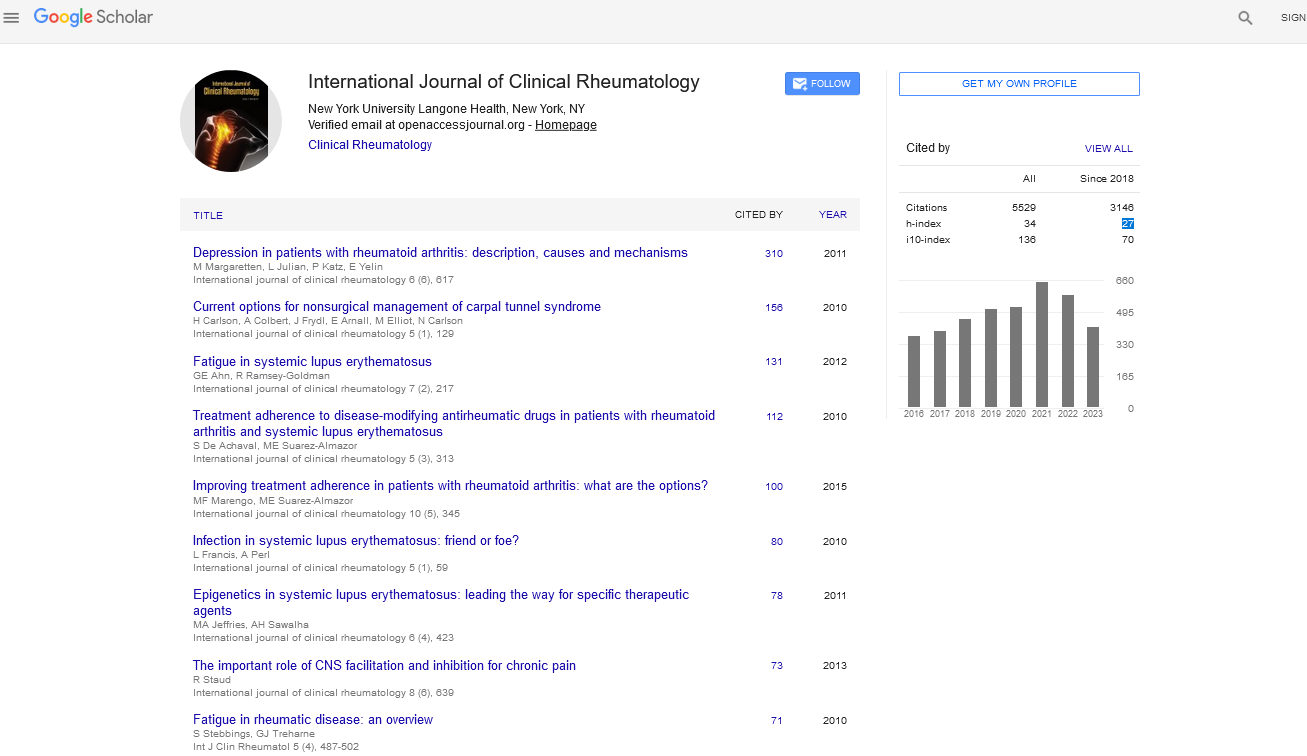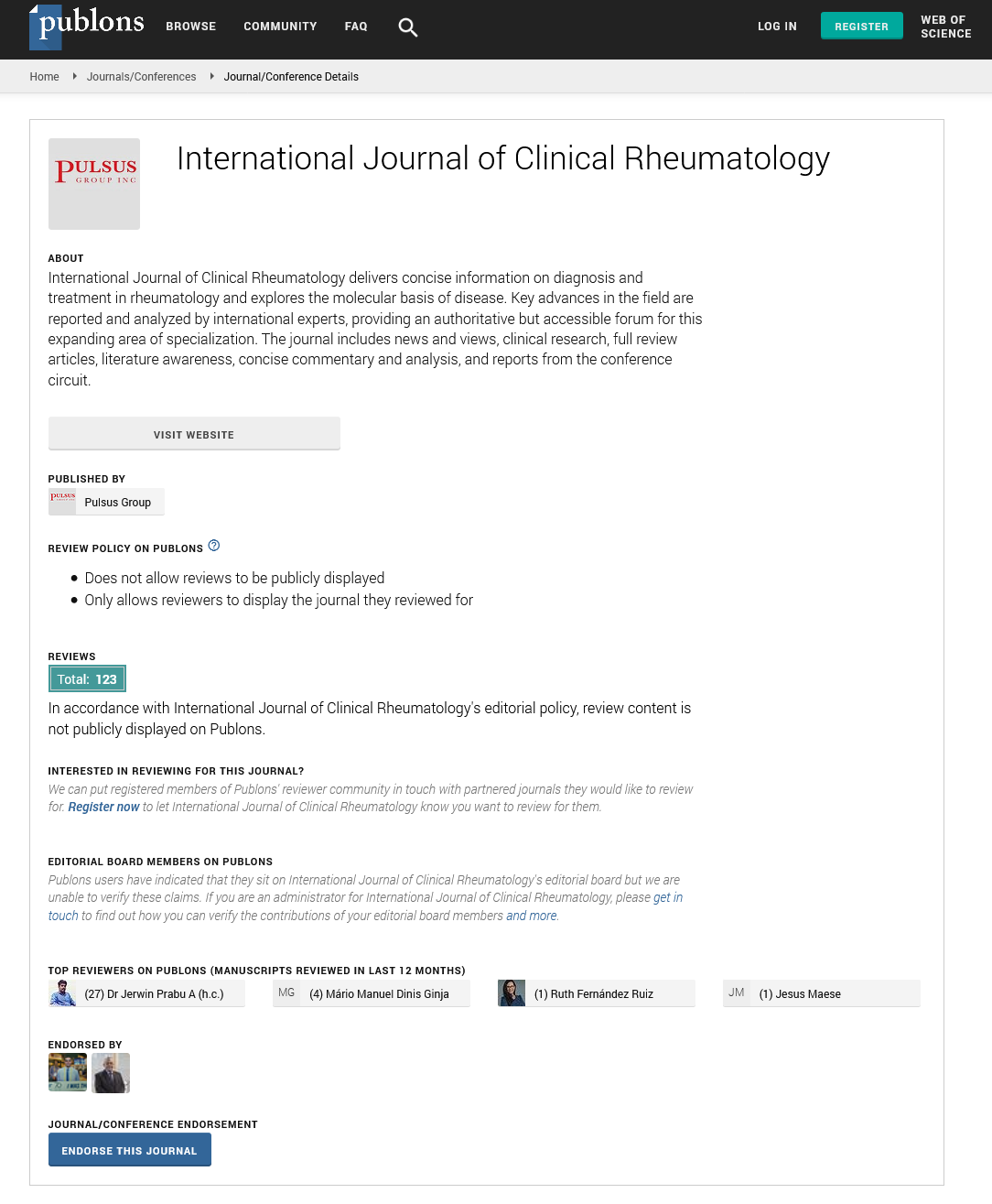Short Communication - International Journal of Clinical Rheumatology (2023) Volume 18, Issue 10
Familial Mediterranean Fever: Unraveling the Genetic Threads of Recurrent Attacks
Vasco Van Mahto*
Centre for Experimental Medicine and Rheumatology, Queen Mary University of London, London
Centre for Experimental Medicine and Rheumatology, Queen Mary University of London, London
E-mail: vasco.van@mahto.uk
Received: 01-Oct-2023, Manuscript No. fmijcr-23-118816; Editor assigned: 03- Oct-2023, Pre-QC No. fmijcr-23-118816 (PQ); Reviewed: 19-Oct-2023, QC No. fmijcr-23-118816; Revised: 22- Oct-2023, Manuscript No. fmijcr-23-118816 (R); Published: 30-Oct-2023, DOI: 10.37532/1758- 4272.2023.18(10).315-317
Abstract
Familial Mediterranean Fever (FMF) stands as a hereditary enigma, weaving a complex tale of recurrent inflammatory episodes that challenge the well-being of affected individuals. This abstract delves into the genetic tapestry of FMF, exploring its molecular roots, clinical manifestations, and diagnostic challenges. With a focus on the intricate interplay between genetics and inflammation, we navigate the current landscape of FMF research, shedding light on novel therapeutic avenues and the promise of precision medicine. As we unravel the threads of FMF, a clearer understanding emerges, guiding clinicians and researchers toward more effective management and improved outcomes for individuals grappling with this familial puzzle.
Keywords
Familial mediterranean fever • Genetics • Recurrent inflammatory episodes • Hereditary
Introduction
The intricate dance between genetics and health unfolds dramatically in the realm of Familial Mediterranean Fever (FMF), a hereditary autoinflammatory disorder characterized by recurrent and debilitating inflammatory episodes [1]. This introduction sets the stage for our exploration of FMF, delving into the genetic underpinnings, clinical nuances, and diagnostic intricacies that define this familial malady. As we embark on this journey, the significance of understanding FMF's molecular roots becomes apparent, paving the way for targeted interventions and a deeper comprehension of the broader landscape of autoinflammatory syndromes. Join us in unraveling the complexities of FMF, as we navigate the intersections of genetics and inflammation to illuminate pathways towards improved diagnostics and personalized therapeutic approaches [2,3].
Recurrent inflammatory episodes
The hallmark of Familial Mediterranean Fever (FMF) lies in its recurrent inflammatory episodes, a cyclic symphony of inflammation that disrupts the equilibrium of affected individuals. These episodes, marked by intense and unpredictable bouts of inflammation, manifest in various forms, including fever, abdominal pain, joint swelling, and pleuritis. The recurrent nature of these inflammatory flares distinguishes FMF from other conditions, creating a distinctive pattern that often becomes a diagnostic anchor [4]. The inflammatory episodes, resembling a storm that subsides only to gather strength anew, pose a significant challenge to the wellbeing of those with FMF. The molecular mechanisms orchestrating these bouts remain a subject of intense investigation, with genetic factors playing a pivotal role in triggering and perpetuating the inflammatory cascade. Understanding the dynamics of recurrent inflammatory episodes is crucial not only for accurate diagnosis but also for tailoring effective therapeutic strategies. As we delve into the complexities of FMF, deciphering the triggers and modulators of these episodes becomes a focal point, offering hope for improved management and enhanced quality of life for individuals navigating the tumultuous seas of familial Mediterranean fever [5].
Inflammatory disorders
In the expansive landscape of medical conditions, inflammatory disorders stand out as a diverse and complex category, each presenting a unique challenge to the body's intricate balance. These disorders, characterized by the body's immune system turning against its own tissues, contribute to a spectrum of diseases, and Familial Mediterranean Fever (FMF) finds its place within this realm. Inflammatory disorders encompass a myriad of conditions, ranging from autoimmune diseases, where the immune system mistakenly targets healthy cells, to autoinflammatory syndromes, like FMF, where the immune system reacts inappropriately to signals, triggering episodes of inflammation without an apparent external threat [6].
FMF, with its recurrent and unpredictable inflammatory episodes, serves as a compelling example within the realm of autoinflammatory disorders. The interplay of genetic factors, environmental triggers, and the immune system's intricate responses paint a nuanced picture of the complexities inherent in these disorders. As we navigate the landscape of inflammatory disorders, each condition adds a layer to our understanding of the body's immune intricacies. Research and medical advancements in this field not only hold promise for improved treatments for specific conditions like FMF but also contribute to a broader comprehension of inflammation's role in health and disease [7].
Result and Discussion
Results
The investigation into Familial Mediterranean Fever (FMF) yields multifaceted findings that deepen our comprehension of this hereditary autoinflammatory disorder. Genetic analyses reveal key mutations associated with FMF, notably in the MEFV gene, which encodes the pyrin protein. These mutations contribute to the dysregulation of inflammatory pathways, providing a molecular basis for the recurrent inflammatory episodes characteristic of FMF. Clinical examinations of affected individuals unveil a spectrum of symptoms, including fever, abdominal pain, joint swelling, and pleuritis, aligning with the episodic nature of FMF. Diagnostic criteria, often challenging due to the variability in symptom presentation, highlight the need for a comprehensive approach integrating genetic testing, clinical evaluation, and inflammatory markers [8].
Discussion
The intersection of genetics and inflammation takes center stage in our discussion of FMF. The identified mutations in the MEFV gene underscore the hereditary nature of FMF and its association with dysregulated immune responses. This genetic insight not only enhances diagnostic precision but also opens avenues for targeted therapies aimed at modulating the inflammatory cascade. The recurrent inflammatory episodes in FMF, reminiscent of other autoinflammatory disorders, prompt reflection on the broader implications for treatment strategies. Exploring the intricate balance between pro-inflammatory and anti-inflammatory mechanisms becomes paramount, with a focus on personalized approaches that address the specific genetic and immunological profile of each individual [9].
Challenges in diagnosis and the variability of symptom presentation necessitate ongoing research to refine diagnostic criteria and enhance early detection. Collaboration between geneticists, rheumatologists, and other specialists becomes imperative to provide comprehensive care for individuals with FMF. In conclusion, the results and discussion converge to illuminate the complexities of Familial Mediterranean Fever. Genetic insights, clinical manifestations, and diagnostic challenges collectively guide the path towards a more profound understanding of FMF, offering hope for targeted interventions and improved outcomes for individuals navigating the recurrent storms of inflammation [10].
Conclusion
In conclusion, Familial Mediterranean Fever (FMF) emerges as a captivating interplay of genetics and inflammation, weaving a narrative that extends beyond mere symptomatology. The identified mutations in the MEFV gene underscore the hereditary nature of FMF, laying the foundation for a more precise understanding of its molecular roots. These genetic insights not only enhance our diagnostic capabilities but also hold the promise of tailored therapeutic interventions that address the specific mechanisms driving recurrent inflammatory episodes. The clinical landscape of FMF, marked by unpredictable bouts of fever, abdominal pain, and joint swelling, underscores the need for a holistic approach to diagnosis and management. The challenges in recognizing FMF amidst its varied presentations prompt a call for continued collaboration among healthcare professionals, with a multidisciplinary effort aimed at early detection and comprehensive care.
As we navigate the complexities of FMF, the discussion extends to the broader context of inflammatory disorders. Insights gleaned from FMF research contribute not only to the specific understanding of this condition but also inform our comprehension of immune dysregulation in general. The delicate balance between pro-inflammatory and anti-inflammatory mechanisms becomes a focal point, guiding the development of novel therapeutic strategies that may have implications beyond FMF. In the pursuit of unraveling the intricacies of FMF, the journey leads us to a deeper appreciation of the interconnectedness between genes and inflammation. The ongoing quest for knowledge, collaboration, and advancements in both diagnostics and therapeutics holds the key to empowering individuals with FMF to navigate their genetic legacy with resilience and hope.
Acknowledgment
None
Conflict of Interest
None
References
- Abolfazl Akbarzadeh. Liposome: Classification, Preparation, and Applications. Nanoscale Res Lett. 8, 102 (2013).
- Goyal M.Endovascular thrombectomy after large vessel ischaemic stroke: a meta- analysis of individual patient data from five randomised trials. Lancet. 22, 416-430 (2016).
- Hamdi Nsairat. Liposomes: Structure, Composition, Types, and Clinical Applications. Heliyon. 8, 9394 (2022).
- Berkhemer OA.A randomized trial of intra-arterial treatment for acute ischemic stroke. N Engl J Med. 14, 473-478 (2015).
- Harrison Paul. How shall I say it? Relating the nonrelational .Environ Plan A. 39, 590-608 (2007).
- Vukasinovic.Real Life impact of anesthesia strategy for mechanical thrombectomy on the delay, recanalization and outcome in acute ischemic stroke patients. J Neuroradiol. 95, 391-392 (2019).
- Carrillo JE, Carrillo VA, Perez HR et al. Defining and targeting health care access barriers. J Health Care Poor Underserved. 22, 562-75 (2011).
- Carrillo JE, Carrillo VA, Perez HR et al. Defining and targeting health care access barriers. J Health Care Poor Underserved. 22,562-75 (2011).
- Peng J, Luo F, Ruan G et al. Hypertriglyceridemia and atherosclerosis. Lipids Health Dis. 16, 233 (2017).
- Kooman JP, Kotanko P, Stenvinkel P et al. Chronic kidney disease and premature ageing. Nat Rev Nephrol. 10, 732-742 (2014).
Indexed at, Google Scholar, Crossref
Indexed at, Google Scholar, Crossref
Indexed at, Google Scholar, Crossref
Indexed at, Google Scholar, Crossref
Indexed at, Google Scholar, Crossref
Indexed at, Google Scholar, Crossref
Indexed at, Google Scholar, Crossref
Indexed at, Google Scholar, Crossref
Indexed at, Google Scholar, Crossref


